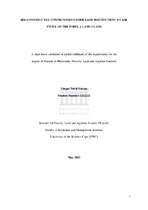(Re)constructed communities under land restitution : a case study of the Popela land claim
Abstract
This dissertation explores the notions of community identity as they relate to land restitution. Specifically, the dissertation examines how community is (re)constructed in the Popela case study by examining how the claimants (former labour tenants) have framed their experience of dispossession and their understanding of their rights in land. Oftentimes, claimant groups will articulate their shared history as it relates to the land, and within this narrative they will seek to highlight the legitimacy of their claim. In this regard, rural communities tend to submit claims for restitution on the basis of the forced dispossession of the tribe. In contrast, labour tenants’ claims for restitution are based on the dispossession of grazing and cropping rights linked to their labour as individuals. The dissertation explores how the Popela claimants have (re)constructed their community identity. It shows that their discourse is characterized by conflicting notions of community and belonging, and traces the connections between these contradictions and the concessions the claimants had to make in adopting definitions and terms that have been imposed on them. It argues that while claimants appear to have accepted the Constitutional Court’s view of the basis of their claim, a ‘hidden transcript’ of commitment to community identity still persists, carefully hidden from public view in order to be awarded restitution.

